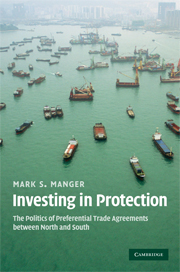Book contents
- Frontmatter
- Contents
- List of figures
- List of tables
- Acknowledgments
- List of abbreviations
- Japanese names and conventions
- 1 Introduction
- 2 Framework for analysis
- 3 NAFTA – the original sin?
- 4 Iberian ties: the EU–Mexico free trade agreement
- 5 The odd couple: the Japan–Mexico free trade agreement
- 6 The far side of the world: preferential trade agreements with Chile
- 7 Japan's NAFTA route: preferential trade agreements with Malaysia and Thailand
- 8 Conclusions and implications
- References
- Index
1 - Introduction
Published online by Cambridge University Press: 08 January 2010
- Frontmatter
- Contents
- List of figures
- List of tables
- Acknowledgments
- List of abbreviations
- Japanese names and conventions
- 1 Introduction
- 2 Framework for analysis
- 3 NAFTA – the original sin?
- 4 Iberian ties: the EU–Mexico free trade agreement
- 5 The odd couple: the Japan–Mexico free trade agreement
- 6 The far side of the world: preferential trade agreements with Chile
- 7 Japan's NAFTA route: preferential trade agreements with Malaysia and Thailand
- 8 Conclusions and implications
- References
- Index
Summary
In late September 2006, a short letter arrived at the Secretariat of the World Trade Organization in Geneva that formally announced the entry into force of the United States–Bahrain Free Trade Agreement, bringing the number of notified trade accords to 200. With every preferential trade agreement (PTA) – an arrangement that liberalizes trade between member states only – the principles of multilateralism and non-discrimination in international trade as embodied by the World Trade Organization (WTO) lose more relevance. When the letter was received, already more than half of global commerce was conducted under the rules of one PTA or another.
How different the world of international trade diplomacy looked only twelve years earlier. After almost eight years of negotiations, ministers of 109 countries shook hands in Marrakesh on April 15, 1994, on the occasion of the signature of the most ambitious multilateral trade agreement in history. The final deal brought agriculture into the domain of the General Agreement on Tariffs and Trade (GATT) and created the General Agreement on Trade in Services (GATS), a GATT counterpart for services, by then making up a third of global commerce. Most importantly, it established the World Trade Organization itself, a formal international institution with its own staff and seat in Geneva (Barton et al. 2006: 93).
The mood was euphoric. US Vice-President Al Gore, who had flown in to address the meeting, called the deal “truly momentous.”
- Type
- Chapter
- Information
- Investing in ProtectionThe Politics of Preferential Trade Agreements between North and South, pp. 1 - 26Publisher: Cambridge University PressPrint publication year: 2009



